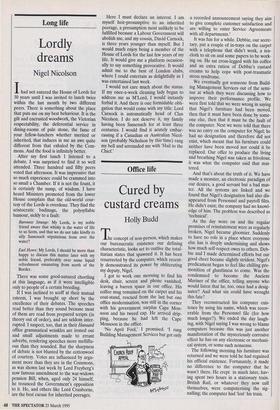Long life
Lordly dreams
Nigel Nicolson
Ihad not entered the House of Lords for 30 years until I was invited to lunch twice within the last month by two different peers. There is something about the place that puts me on my best behaviour. It is the gilt and encrusted woodwork, the Victorian respectability, the deferential service in dining-rooms of pale stone, the fame of your fellow-lunchers whether merited or inherited, that induces in me an awe quite different from that exhaled by the Com- mons. And the food is infinitely better.
After my first lunch I listened to a debate. I was surprised to find it so well attended. Three hundred and fifty peers voted that afternoon. It was impressive that so much experience could be crammed into so small a Chamber. If it is not the fount, it is certainly the sump, of wisdom. I have heard Ministers promoted from the lower House complain that the old-world cour- tesy of the Lords is overdone. They find the aristocratic badinage, the polysyllabic humour, sickly to a fault:
Baroness Strange: My Lords, is my noble friend aware that whisky is the water of life to us Scots, and that we do not take kindly to silly Sassenach stipulations from over the water?
Earl Howe: My Lords, I should be more than happy to discuss this matter later with my noble friend, preferably over some liquid refreshment emanating from north of the Border.
There was some good-natured chortling at this language, as if it were intelligible only to people of a certain breeding.
If I was inclined to scoff at their mutual esteem, I was brought up short by the excellence of their debates. The speeches read better than they sound because most of them are read from prepared scripts (in theory out of order), and are seldom inter- rupted. I suspect, too, that in their Hansard office grammatical wrinkles are ironed out and small adjustments made to errant adverbs, rendering speeches more melliflu- ous than they sounded. But the sharpness of debate is not blunted by the cottonwool of courtesy. Votes are influenced by argu- ment more than they are in the Commons, as was shown last week by Lord Freyberg's now famous amendment to the war-widows pension Bill, when, aged only 24 himself, he trounced the Government's opposition to it. He, and others like Lord Cranbome, are the best excuse for inherited peerages. Here I must declare an interest. I am myself heir-presumptive to an inherited peerage, a presumption most unlikely to be fulfilled because a Labour Government will abolish me, and my cousin, David Carnock, is three years younger than myself. But I would much enjoy being a member of the House of Lords for the last few years of my life. It would give me a platform occasion- ally to say something provocative. It would admit me to the best of London clubs, where I could entertain as delightfully as I was entertained last week.
I would not care much about the status. If my once-a-week cleaning lady began to address me as M'Lord, I would instantly forbid it. And there is one formidable obli- gation that would come with my title: Lord Carnock is automatically head of Clan Nicolson. I do not deserve it, my family having been Sassenach for at least three centuries. I would find it acutely embar- rassing if a Canadian or Australian Nicol- son (probably Nicholson by this *time) rang my bell and serenaded me with 'Hail to the Chief.'


























































 Previous page
Previous page